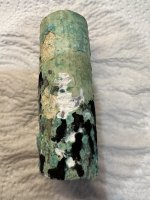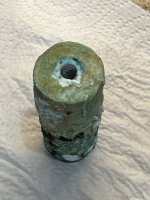- Jun 18, 2021
- 11
- Pool Size
- 20000
- Surface
- Vinyl
- Chlorine
- Salt Water Generator
- SWG Type
- Pentair Intellichlor IC-40
I’ve researched most of the comments on here, and they are mostly in favor of this being pseudoscience. I have had this pool for 3 years, it’s about 5 years old. I took off the cover of the inline zinc anode and it looks like this.
Should I…
Throw it away and not replace it
Try to scrub it off somehow and stick it back in
Stick in back in as is
Buy a new zinc rod to replace it
Thanks
Dustin
Should I…
Throw it away and not replace it
Try to scrub it off somehow and stick it back in
Stick in back in as is
Buy a new zinc rod to replace it
Thanks
Dustin



